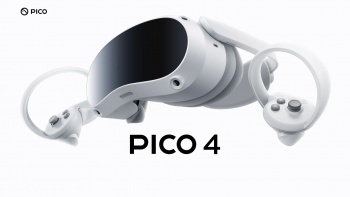Pico 4
| Pico 4 | |
|---|---|

| |
| Basic Info | |
| VR/AR | VR |
| Type | head-mounted display |
| Subtype | Standalone VR |
| Platform | Pico Store |
| Manufacturer | Pico |
| Announcement Date | September 22, 2022 |
| Release Date | October 18, 2022 |
| Price | $430 |
| Website | picoxr.com |
| System | |
| Operating System | Pico OS 5.0 (Android) |
| Chipset | Qualcomm Snapdragon XR2 |
| CPU | Octa-core Kryo 585 (1 x 2.84 GHz, 3 x 2.42 GHz, 4 x 1.8 GHz) |
| GPU | Adreno 650 |
| Storage | |
| Storage | 128 GB |
| Memory | 8 GB LPDDR4 |
| SD Card Slot | No |
| Display | |
| Display | 2 x LCD |
| Subpixel Layout | RGB stripe |
| Resolution | 2160x2160 per-eye |
| Refresh Rate | 90 Hz |
| Image | |
| Horizontal FoV | 104° |
| Visible FoV | 104° (horizontal), 103° (vertical) |
| Rendered FoV | 104° (horizontal), 104° (vertical), 122.16° (diagonal) |
| Binocular Overlap | 104° |
| Average Pixel Density | 20.76 PPD (horizontal), 20.76 PPD (vertical) |
| Peak Pixel Density | 20.76 PPD |
| Foveated Rendering | No |
| Optics | |
| Optics | Pancake lenses |
| Ocularity | Binocular |
| IPD Range | 62-72 mm |
| Adjustable Diopter | No |
| Passthrough | 16MP RGB camera |
| Tracking | |
| Tracking | 6 DoF Inside-out |
| Base Stations | No |
| Eye Tracking | No |
| Face Tracking | No |
| Hand Tracking | Yes |
| Body Tracking | No |
| Audio | |
| Audio | Integrated stereo speakers |
| Microphone | Yes |
| 3.5mm Audio Jack | No |
| Connectivity | |
| Ports | USB Type-C |
| Wired Video | USB Type-C |
| Wireless Video | WiFi streaming |
| WiFi | WiFi 6 802.11 a/b/g/n/ac/ax |
| Bluetooth | Bluetooth 5.1 |
| Battery Capacity | 5300 mAh |
| Battery Life | 3 hours |
| Device | |
| Material | Plastic, foam facial interface |
| Headstrap | Hard padded retractable strap |
| Color | White / grey |
| Input | 2 x Pico 4 Controller |
Pico 4
Pico 4 is a virtual reality (VR) headset developed by Bytedance, designed to compete with Meta's Quest 2 in the mobile VR market. It represents Bytedance's first significant foray into the VR headset arena.
Overview
The Pico 4 is often lauded for its light front end, slightly higher resolution and field of view, and improved edge-to-edge clarity. It also features color passthrough and new VR controllers with innovative tracking arcs, aimed at enhancing the VR streaming experience. However, it's less suitable for users who prioritize a clear and smooth image, are sensitive to screen-door effects, or require a stable and comfortable headset fit. The device's data handling policies, which involve sharing data with partners, may also raise privacy concerns.
Design and Features
Hardware
The Pico 4 boasts a smaller form factor and significantly lower weight compared to its predecessors and competitors. It incorporates pancake lenses without a Fresnel cut, which contribute to the headset's lighter and narrower design. The resolution is 2,160 x 2,160 pixels per eye, higher than the Pico Neo 3 Link and Quest 2, although the difference is not prominently visible in practical use. The standard refresh rate is 72 Hz, with an option to switch to 90 Hz for a smoother picture.
Visual Experience
While the Pico 4 offers a larger field of view and excellent image clarity at the center and edges, users may notice a screen-door effect, particularly in high-contrast scenes. The display tends to have irregular artifacts, causing a bumpy picture when moving the head. Colors often appear washed out and darker, especially when compared to the Quest 2. High-contrast areas can create a glare or smeared effect on the lenses, detracting from the overall visual quality.
Comfort and Fit
Despite its lighter visor, the Pico 4 suffers from poor fit stability due to its non-interchangeable plastic halo head mount. This design issue leads to unstable positioning during quick head movements and can cause discomfort, particularly for users who wear glasses.
Performance
Tracking and Controllers
The Pico 4's tracking for both the VR headset and controllers is generally excellent. However, hand tracking is limited and often inaccurate. The VR controllers are well-designed but may pose issues for users with larger hands in certain games.
Sound and Software
The integrated sound system of the Pico 4 provides decent audio quality, though it lacks a headphone jack, and the microphone quality is subpar. The software interface, inspired by Meta's design, is user-friendly and largely bug-free. The Pico Store's offerings are growing slowly, lagging behind the more extensive Quest Store.
Streaming Capabilities
Pico 4 supports both wireless and wired SteamVR streaming, with performance varying depending on the setting and application. While the "HD" setting offers good visuals and smooth performance in some applications, others may experience stuttering. Sound quality issues have been noted, particularly when compared to the Meta Link and Air Link on Quest 2.
Privacy Concerns
Bytedance's privacy policy for the Pico 4 indicates that all collected data may be shared with partners. This raises concerns for users wary of data privacy, especially given Bytedance's reputation for data collection in other ventures, such as TikTok.

